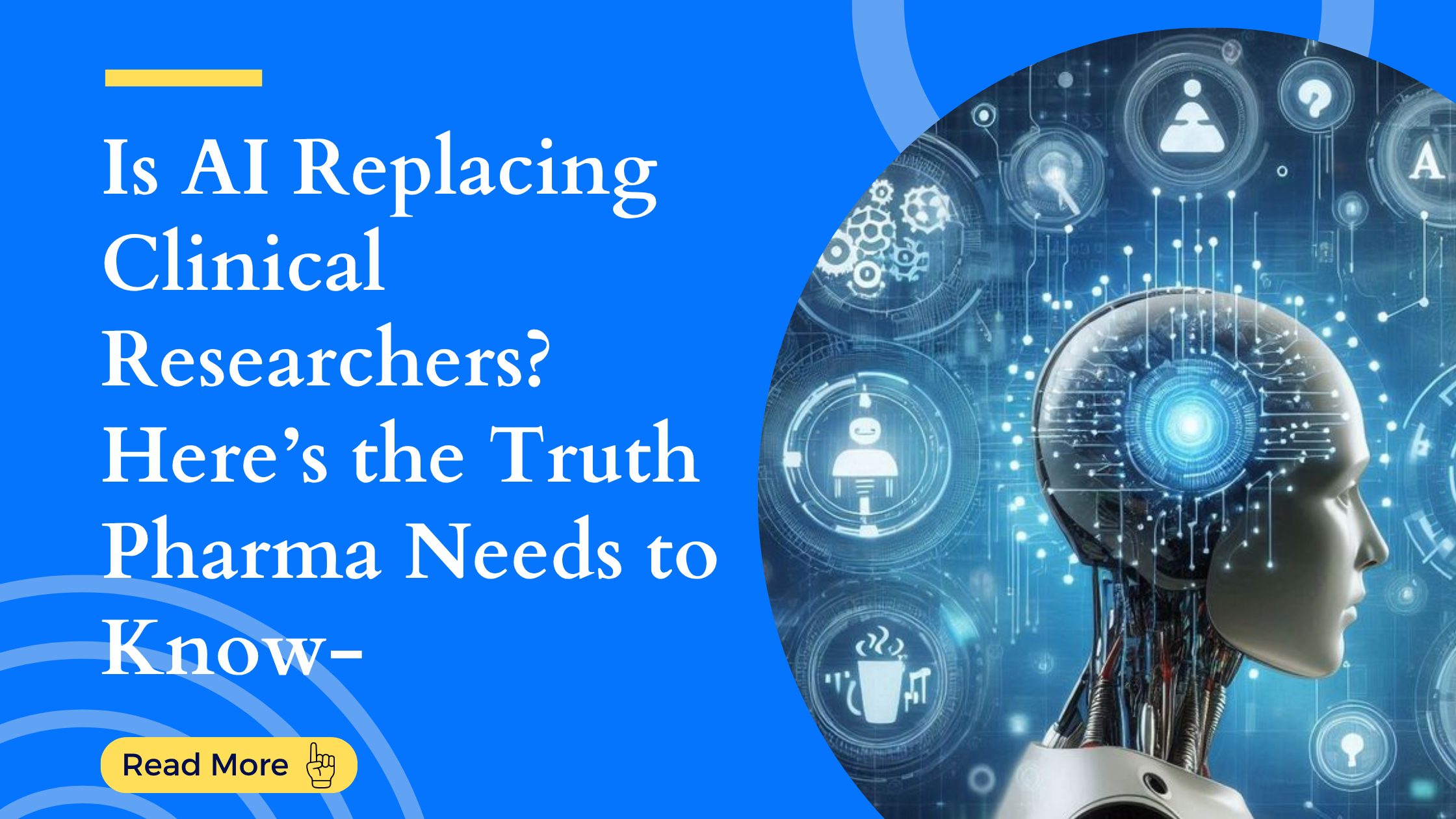Is AI Replacing Clinical Researchers? Here’s the Truth Pharma Needs to Know
We live in a world where technology moves fast, and artificial intelligence (AI) is transforming across industries. AI is reshaping the way we work, and clinical research is feeling the impact too. From automating repetitive processes to uncovering actionable insights in vast datasets, AI is making clinical trials smarter, faster, and more efficient.
AI in Clinical Trials: A Powerful Partner, not a Replacement
Clinical Research Organizations (CROs) can unlock huge value by combining AI tools with expert human insight to run smarter trials, reduce errors, enhance patient recruitment, and reach the right participants faster. The future is human + AI working together.
AI in Medicine: The Origin Story
In the early 1970s, MYCIN, an AI-based expert system developed at Stanford University, was designed to diagnose bacterial infections like meningitis and bacteraemia and recommend personalized antibiotic treatments. It worked by asking physicians a series of questions and then providing diagnoses with confidence levels, along with suggested treatments. Although never used in actual clinical practice due to legal and ethical concerns, MYCIN was a groundbreaking innovation that laid the foundation for the use of AI in modern medicine and clinical research.
The Expanding Role of AI in Clinical Trials
AI is revolutionizing how data is collected, managed, and analysed in clinical research. With the help of machine learning and advanced analytics, CROs can now:
- Predict patient recruitment success using real-world data and behavioural trends
- Identify high-performing trial sites based on historical metrics
- Automate data entry and cleaning, minimizing human error and saving time
- Monitor patient compliance through digital health tools and wearable devices
- Process unstructured data, including clinical notes and laboratory reports, with speed and accuracy
These innovations significantly improve trial timelines and data quality. Yet, while AI can enhance operations, it cannot replicate the clinical judgment, empathy, and decision-making that humans bring to the table.
Why Clinical Researchers Are Still Irreplaceable
Clinical trials are multifaceted and require more than just data processing. They demand a nuanced understanding of protocol design, regulatory requirements, cultural diversity, and ethical standards. AI supports these areas, but cannot fully substitute the human touch. Specifically, AI lacks the ability to:
- Navigate complex clinical decisions based on patient-specific factors
- Respond to ethical dilemmas with emotional intelligence
- Build patient relationships that foster trust and engagement
- Adapt to on-site challenges and unexpected protocol deviations
In short, clinical researchers are the backbone of trial success. They bring insights, compassion, and adaptability that technology alone cannot achieve.
Learn more about our clinical research capabilities on our About Us page.
The Power of Human-AI Collaboration: A Strategic Advantage
Progressive CROs are moving beyond the “AI with human” narrative. Instead, they are embracing a synergistic model, where AI complements the work of clinical teams. This balance allows researchers to focus on higher-value activities—strategizing, innovating, and making critical decisions—while AI takes on the heavy lifting of data analysis and process automation.
Here’s how leading CROs are blending AI with human expertise:
- Smarter Patient Recruitment
AI scans vast datasets—including EHRs, social platforms, and health registries—to pinpoint eligible participants. Human researchers then validate candidates, ensuring ethical enrolment and effective communication.
- Adaptive Trial Design
AI models simulate trial outcomes based on prior studies. Researchers use these simulations to choose the most promising design and pivot in real time when needed.
- Enhanced Risk-Based Monitoring (RBM)
AI flags potential risks and anomalies early. Monitors assess these alerts and apply human judgment to investigate and resolve issues, ensuring patient safety and regulatory alignment.
- Streamlined Regulatory Documentation
Natural language processing tools can generate first drafts of reports and submissions. Human professionals refine them to meet diverse and evolving regulatory expectations.
Looking Ahead: Building a Tech-Human Ecosystem
Rather than view AI as a threat, clinical researchers should see it as a powerful collaborator. CROs that strategically integrate AI, while nurturing the talents of their human teams—are better positioned to meet the growing demands of pharma sponsors.
Today’s pharma clients are seeking more than service providers. They want adaptable, technology-driven partners who deliver results without compromising quality or ethics. This is where human-AI synergy becomes a game changer.
Final Thoughts
So, is AI replacing clinical researchers?
No—and it shouldn’t.
Here’s the truth: AI isn’t here to replace people, it’s here to support them.
The future of clinical trials lies not in choosing between humans and technology, but in empowering both. AI brings speed, scale, and consistency. Researchers bring insight, empathy, and adaptability. Together, they are reshaping how we bring life-changing therapies to patients.
AI is the engine. Clinical researchers are the drivers. Together, they are the future of clinical research.
Conclusion: Abiogenesis Clinpharm
At Abiogenesis Clinpharm, we believe that true innovation lies in harmony between human intelligence and emerging technologies. As a leading full-service CRO based in Hyderabad, India, we combine scientific expertise, regulatory excellence, and every phase of clinical development—from Phase I to Phase IV.
Let’s work together to redefine what’s possible in clinical research.
👉Contact: [email protected] to learn more about how Abiogenesis Clinpharm can support your current or upcoming trial.

